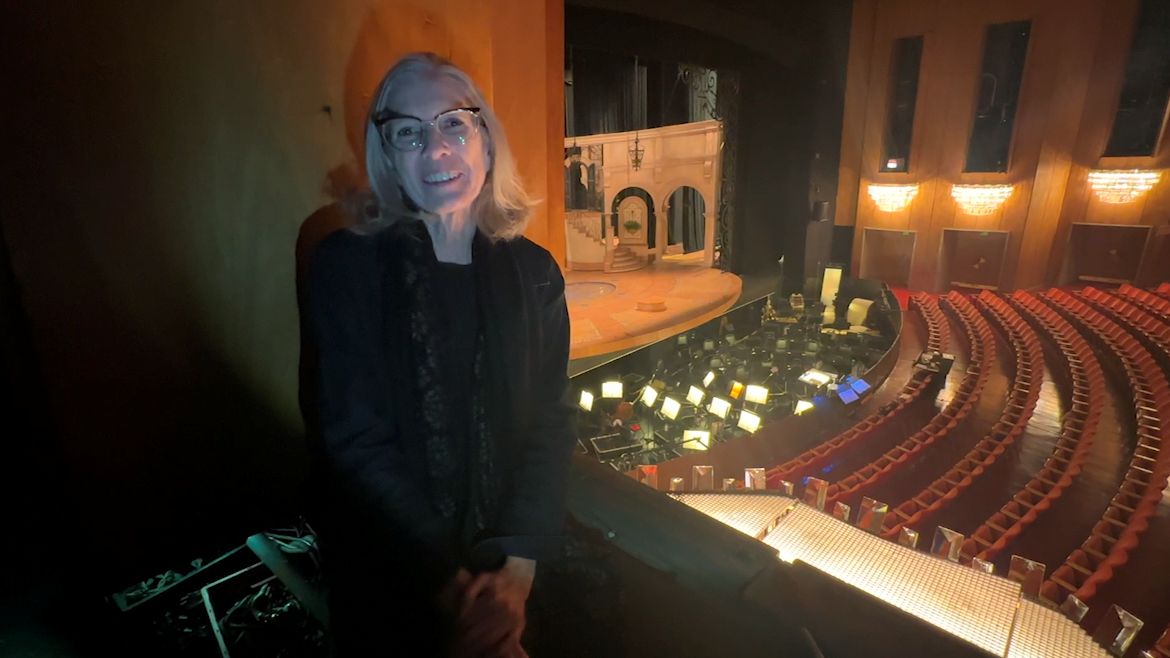LOS ANGELES — Talking at the theater is generally frowned upon, but not for JC Henning.
“It’s Count Almaviva in disguise,” she whispered, her hand cupped around a microphone centimeters from her face.
For 23 years Henning has been an audio describer of live theatrical events. She’s described musicals like “Les Miserable” and “Hamilton” at the Pantages, and plays like the recent “Our Dear Dead Drug Lord” at the Kirk Douglas Theatre.
Soon, she’ll return to the Hollywood to work the Mariah Carey concerts.
But one of her venues across the city is the LA Opera, where she’s been doing audio description for the past two years.
Her connection to the company goes back a lot further — 35 years, in fact, to when she made her debut as a supernumerary, or non-singing role, in “La Boheme.”
“I was the lady in the window waving a little French flag,” she recalled.
In a way, that role foreshadowed where she is now.
“I’m a lady in a window now,” she laughed, perches in her window overlooking the stage. “I’m always going to be a lady in a window.”
Audiences likely don’t notice her there, tucked among the lighting equipment in what she calls the best seat in the house. It’s in this small, dark space that she sits with a tablet sized monitor, following the actions and whispering into a microphone for patrons, many of whom are blind.
“People who have lost their vision or who are partially sighted,” Henning explained. “People who have dyslexia who can’t read the supertitles. It is my joy to share the opera and make it accessible to those folks.”

Her job requires a lot of attention to detail. Before the show starts on stage, her performance begins in the booth. She reads patrons the synopsis from the program, then describes the set and the singers, their costumes and wigs.
“The filigree lanterns… the terracotta building and the orange sky behind it,” she waxed poetically about the gorgeous scenery for The Barber of Seville. “We paint the picture with words so that each setting comes alive for the person who is not sighted.”
Once the action begins, she goes into double time, reading the supertitles while also describing what she deems to be essential, non-verbal action.
“There could be a certain playfulness between the characters that the audience reacts to,” Hennings explained, “and the person who’s blind wants to know what is the joke? And they don’t want to know after the fact.”
All of this is delivered in her quick whisper, to avoid stepping on the singers too much. She knows their voices are the main event. But for patrons like Joseph Landau, what JC provides is invaluable.
“I didn’t know about the service until I became blind,” Landau said.
He lost his peripheral vision in a car accident almost 20 years ago, and at the time worried that he would no longer get to enjoy all the arts LA has to offer. But thanks to JC’s audio description, which he hears in a headset, he says he’s able to fully appreciate operas and other performances.
He’s also grateful that LA Opera lets him attend with his guide dog, Vino. It’s a double bonus, he says. He gets to navigate his world fully and safely while also raising awareness.
“For people that do have sight to see what working guide dogs do,” he explained.
Michell Magaldi, production director for LA Opera, says these are just some of the programs designed to make opera accessible to all.
“We have a lot to share the opera,” she said at a recent dress rehearsal. “We want to be sure to remove any barriers people have to experiencing the show.”
That afternoon a group of local students sat in the balcony, part of an educational outreach program. There are also wheelchair accessible seats and amplified audio devices. But their efforts aren’t restricted to the Dorothy Chandler Pavilion.
“Some are through our Off Grand series, which takes opera out into other theaters around LA County,” Migaldi explained. “We also have our Connects program, which is focused on education and community outreach. They’re doing everything from school tours and going into libraries to…other events in our lobby and other spaces around campus.”
Henning’s space, though, is one the public never gets to see. Up in her booth, she doesn’t just recite the libretto the way she says one might call a baseball game. She brings the opera to life, with a passion that can be heard loud and clear even in her whisper.
“I’m engaged in the opera, and I’m reacting to what I’m seeing on stage,” Henning said. “I can’t help but be amused at the same time that I’m working, and actually put a smile on my voice when appropriate.”
Audio Description is only available at certain performances and is listed on LA Opera’s website. For patrons, the service is free, and one Henning feels fortunate to provide.
“To be in a theater, for Barber of Seville and feel the audience around you laughing and enjoying and clapping and jumping to their feet and screaming, ‘Bravo, Bravo, Bravi!,’ there’s nothing like that,” she explained. “And why should someone who’s not sighted be deprived of this?”
“Every day I wake up and I am so grateful, so grateful that this job exists and I get to do this for a living,” she continued. “For me, it is a job, a career with purpose.”
Bravo to that!



